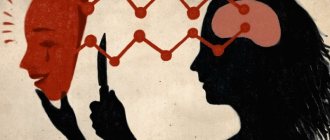Causes
The causes of insomnia before menstruation are not fully understood. Some scientists believe that PMS occurs in all women, but in some of them the manifestations are mild and unnoticeable. Mild symptoms are not accompanied by deterioration in well-being. Research shows that PMS is more often diagnosed in women with an asthenic physique who are underweight. It is assumed that the following factors are involved in the pathogenesis:
- Endocrine disorders, for example, hypoglycemia (decrease in blood glucose concentration) and other disorders of carbohydrate metabolism, hyperprolactinemia (increase in the concentration of the hormone prolactin in the blood), fluctuations in the level of sex hormones - estrogen, progesterone. An excess of aldosterone (adrenal cortex hormone) and antidiuretic hormone can provoke sleep disturbances.
- Hereditary predisposition. Typically, acute PMS is detected in women whose close relatives suffered from severe manifestations of the pathology.
- Lack of serotonin (the main inhibitory neurotransmitter). Serotonin deficiency increases the sensitivity of the pain perception system - a slight irritation is felt as severe, excruciating pain.
- Lack of microelements (magnesium, calcium, iron), B vitamins, polyunsaturated fatty acids.
The attending physician will tell you why there is insomnia before menstruation, having found out the reasons during a diagnostic examination. Statistics show that PMS is more often detected in women who are engaged in the intellectual sphere of work. The phenomenon is explained by greater susceptibility to mental and emotional stress and stress.
Among the provoking factors are chronic acute stress, a history of mental and gynecological diseases. With PMS, a disturbance in the production of hormones that are involved in the regulation of the luteal phase - serotonin, estrogens, progesterone - is always detected.
Sleep disturbances before menstruation
It is believed that insomnia is one of the main signs of upcoming menstruation, which occurs due to hormonal changes in the female body. Very often, sleep disturbances before the onset of menstruation are associated with a gynecological disease such as endometriosis. Moreover, a similar condition with endometriosis is observed both before menstruation and at the time when they have already occurred.
Sleep problems usually occur depending on each specific period of the menstrual cycle. At the very beginning, when bleeding just begins, a woman may experience daytime drowsiness, which is associated with a decrease in blood estrogen. But the quality of night sleep does not improve.
Then, when estrogen, on the contrary, increases, the woman becomes more restless, sometimes even overexcited, and then insomnia may occur. At this time, great difficulties arise both with falling asleep and with waking up in the morning.
Clinical manifestations
The severity and nature of the disorders vary among different patients. Symptoms are observed over several hours or days (usually up to 10). Symptoms often worsen as a result of stress. An increase in the intensity of clinical manifestations is typical for perimenopause (the period before menopause, which can last from several months to 4 years).
In women during perimenopause, the duration of clinical manifestations often increases, affecting the menstrual phase. Premenstrual syndrome is characterized by changes in the psycho-emotional background. For women during this period, typical symptoms are: increased irritability, unreasonable aggression, anger, and increased anxiety levels. Typically, insomnia with PMS is accompanied by symptoms:
- Emotional lability (instability, mood swings).
- Depressive state.
- Swelling of the soft tissues of the face and distal extremities.
- Painful sensations in the mammary glands.
- Deterioration in performance, increased fatigue.
- Inability to concentrate.
- Apathy, depression.
An increase in the concentration of the hormones progesterone, estrogen, antidiuretic hormone and aldosterone leads to fluid retention and accumulation in the body. The result is swelling, temporary weight gain, a feeling of swelling and pain in the mammary glands.
There is a feeling of pressure and heaviness in the lower segments of the back and abdomen, and general weakness of the body is observed. Young women are characterized by the development of dysmenorrhea - painful menstruation, accompanied by acute, stabbing or aching pain in the lower abdomen. Nonspecific signs:
- Pain in the head area, dizziness.
- Nausea, sometimes vomiting attacks.
- Paresthesia (burning, tingling sensation) in the extremities.
- Fainting, confusion.
- Tachycardia (increased heart rate).
- Changes in eating behavior (absence or increase in appetite, preference for certain foods).
If a woman cannot sleep peacefully, her state of poor health is aggravated by the lack of proper rest. Nonspecific signs include neurodermatitis (skin disease of allergic and neurogenic origin), skin rashes mainly in the facial area.
PMS is typically characterized by a worsening, exacerbation of the course of diseases - dermatological, respiratory system (allergic reactions, asthma, infectious lesions of the respiratory system). If insomnia before menstruation and other symptoms of PMS persistently occur in the 2nd half of the cycle, this may be a manifestation of a dysphoric disorder caused by hormonal imbalance.
Symptoms typical of PMS in dysphoric disorder disappear after the end of menstruation. Dysphoric disorder is characterized by a sharp decrease in mood, severe anxiety, irritability, short temper, and emotional lability. Episodes of sudden sadness and outbursts of anger, attacks of causeless anxiety and tension are typical.
Usually during this period there is an escalation of conflicts in the family and work team. Often, against the background of dysphoria (decreased mood), suicidal thoughts arise. Patients lose interest in the surrounding reality. Unlike mild forms of PMS, dysphoric disorder complicates a woman’s daily activities and professional activities and worsens social adaptation.
How to relieve PMS symptoms
Almost every woman experiences poor health during menstruation. It is impossible to completely eliminate the symptoms of premenstrual syndrome, but it is quite possible to alleviate a woman’s condition at this time.
It is necessary to adhere to several rules so that menstruation does not cause severe discomfort:
- If the symptoms of PMS are pronounced and interfere with a normal lifestyle, then it is advisable to visit a gynecologist and also donate blood to identify the presence of hormonal imbalance in the body. You can also consult a neurologist and an endocrinologist.
- If the doctor has prescribed special medications that alleviate a woman’s condition during menstruation, then it is advisable to take them approximately two or three days before the expected menstruation (antispasmodics, sedatives, etc.). It is also recommended to take complex vitamins.
- It is necessary to monitor your diet during menstruation, eliminate all unhealthy foods, eat as many fresh vegetables and fruits as possible, and minimize the addition of salt to food. The diet should include foods that contain a lot of calcium, for example, lettuce, cabbage.
- To ease the symptoms of menstruation, it is advisable to go to bed on time and breathe fresh air more often.
- Avoid stressful situations.
- You can resort to aromatherapy, but only if you are not allergic.
Experts recommend using decoctions and infusions of various herbs during menstruation; infusions of raspberry leaves, chamomile, valerian, lemon balm, etc. help very well. And it is advisable to take medications only as a last resort, when neither herbal decoctions, nor diet, nor rest help cope. with painful sensations during menstruation.
Every woman is able to control her condition during this period. It is important to lead a healthy and active lifestyle, play sports, try to avoid conflict situations, and if the condition is very serious during menstruation, it is better to be examined by a doctor.
Tags: Insomnia before menstruation
Diagnostics
The diagnosis of PMS is made based on the medical history, the patient’s complaints, and the results of a diagnostic examination. Diagnosis of poor sleep before menstruation is carried out as part of a comprehensive examination. Polysomnography is a method for determining sleep parameters. The study reveals breathing disorders during sleep (night apnea), snoring, eye movements, and pathological motor activity.
Polysomnography also shows the concentration of oxygen in the blood, the tone of the facial and cervical muscles. Differential diagnosis is carried out in relation to pathologies that manifest similar symptoms (hypothyroidism - decreased concentration of thyroid hormones, anemia, autoimmune reactions, mental illness).
Abdominal pain before menstruation
Mild nagging pain is evidence that menstruation is coming soon and is one of the signs of PMS.
It's a week before your period and your lower abdomen hurts? This is probably due to ovulation. This kind of pain occurs in five percent of women every month, and appears due to rupture of the follicle. This condition is not considered a deviation from the norm and does not require any treatment.
Other causes of abdominal pain before menstruation include:
- decrease in the level of endorphins in the blood;
- inflammatory processes in the body;
- severe stress;
- gynecological diseases;
- genital infection.
If you experience severe pain, be sure to consult a doctor.
Ovulation before menstruation
As a rule, ovulation should not occur before menstruation, because the egg is released during bleeding, but sometimes this is possible. The timing of egg maturation may change from time to time. The main signs of ovulation are:
- Increased volume of mucus secretion from the vagina;
- Strong sex drive;
- Minor cramps in the abdomen.
Sometimes these signs are confused with PMS symptoms. Unfortunately, the appearance of ovulation before menstruation may indicate that a woman has gynecological diseases. In addition, stress, bad habits, chronic lack of sleep, poor diet, and excessive physical activity negatively affect our body and can cause menstrual irregularities.
If you have a stable menstrual cycle, then the appearance of ovulation before your period may be evidence of a malfunction in the body.
Treatment of discomfort before menstruation
Treatment of unpleasant sensations before menstruation involves eliminating the factors that cause them. At the appointment, the doctor interviews and examines the patient and prescribes the necessary examination methods. If the sensations are associated with a violation of the monthly cycle, the following may be prescribed for diagnosis:
- tests to detect the level of hCG in the blood;
- Ultrasound of the thyroid gland;
- examination for sexually transmitted diseases;
- hormonal studies;
- Ultrasound of the pelvic organs;
- urine and blood tests;
- MRI.
To determine the causes of chest pain, mammography and ultrasound may be prescribed.
If the cause is a hormone imbalance, hormone therapy is usually given for 12 weeks. If there are infectious diseases, a course of antibiotics may be prescribed. To treat bleeding before menstruation, curettage is often performed.
To treat the manifestations of PMS, psychotherapy is used, which includes: confidential conversation and auto-training. It is very important in the treatment of this syndrome:
- get more rest;
- eat right (you can’t eat spicy and salty foods, coffee);
- exclude intense sports training;
- to refuse from bad habits;
- avoid stress.
When drug treatment, the duration of the disease, the presence of pathologies, and the patient’s age are taken into account. In addition, the following are assigned:
- sedatives and psychotropic drugs;
- antihistamines to treat swelling;
- drugs that improve blood supply to the brain (nootropil, aminalon);
- hormonal agents.
Treatment of patients with premenstrual syndrome is carried out during 3-month cycles, after which a break is taken for 2 or 3 cycles. If signs of PMS appear again, treatment can be repeated. If it was effective, tranquilizers and vitamins may be prescribed as maintenance therapy.
The most important and interesting news about infertility treatment and IVF is now in our Telegram channel @probirka_forum Join us!










